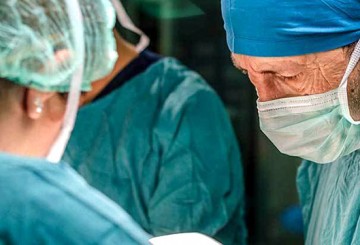Tag: COVID-19
-

Double Lung Transplants Save COVID-19 Patients
Double lung transplants performed by Northwestern Medicine surgeons in patients with irreversible lung damage from COVID-19 helped save lives, according to a recent study.
-

New Drug Connects Dots That Cause Clots in COVID-19 Patients
A gene mutation discovered in a small Amish community in Indiana has inspired the use of a new experimental drug for COVID-19 that reduces blood clotting.
-

Persevering Through Pandemic: Science During COVID-19
In late March, the world came to a virtual standstill. The COVID-19 pandemic forced leaders around the world to limit large gatherings and shutter schools and businesses. For Feinberg’s research enterprise, this was a serious disruption — but science kept moving forward.
-

Medical Students Discuss Study Showing Neurological Impact of COVID-19
Second-year medical students Jeff Clark, Nathan Shlobin, and Steven Hoffman are the co-authors of a first of its kind study, which found that more than 80 percent of patients hospitalized with COVID-19 experienced neurological manifestations.
-

COVID-19 Symposium Promotes Collaborative Research and Educational Opportunities
The Northwestern University Clinical and Translational Sciences (NUCATS) Institute hosted the first virtual COVID-19 symposium, which gave the Northwestern research community an opportunity to learn about efforts to advance public health and respond to the COVID-19 pandemic.
-

McNally Discusses COVID-19 Antibody Study Results, Next Steps
During a recent webinar, Elizabeth McNally, MD, PhD, the Elizabeth J. Ward Professor of Genetic Medicine and director of the Center for Genetic Medicine, discussed findings from the ongoing Screening for Coronavirus Antibodies in Neighborhoods (SCAN) study and what genetics can reveal about COVID-19.
-

IPHAM Leadership Delivers “State of the Institute” Address
In the face of the greatest public health crisis in a century, Feinberg’s Institute for Public Health and Medicine (IPHAM) mobilized with leading-edge science, new grant programs for community partners and a series of informational webinars.
-

Promoting Gender Equity in Academic Medicine During COVID-19
A recent Northwestern Medicine perspective piece published in journal Academic Medicine discussed how the COVID-19 pandemic could impact gender equity within the field, specifically the retention and advancement of women.
-

Soulakis Discusses COVID-19 Contract Tracing Efforts with IDPH
Nicholas Soulakis, PhD, assistant professor of Preventive Medicine in the Divisions of Health and Biomedical Informatics and Epidemiology, discussed lessons learned from his experience leading COVID-19 contract tracing efforts for the Illinois Department of Public Health during a recent webinar.
-

How COVID-19 Impacts Cancer Care and Research
The impact of COVID-19 on cancer patients has been a stark reality for many cancer centers around the world. For the Robert H. Lurie Comprehensive Cancer Center of Northwestern University, a combination of time and dedication to patient care and research has resulted in the development of robust COVID-19 testing protocols to ensure the safety…






